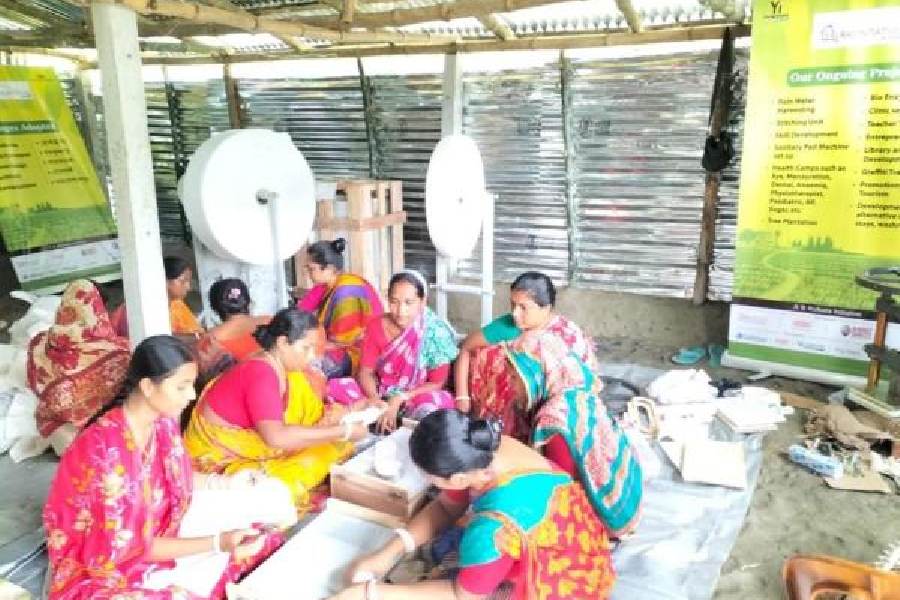A project led by a group of next-generation entrepreneurs is making a difference to the lives of thousands of people near the southernmost tip of Bengal.
The residents of five villages in Basanti block of South 24-Parganas have been receiving basic medical aid and livelihood support since January.
The bulk of the initiative is centred around Godkhali, known as the gateway to the Sunderbans, around 40 minutes from Canning. Most of the ferries and boats on atour of the mangrove delta pick up and drop visitors at Godkhali.
A unit producing biodegradable sanitary pads is one of the highlights of the drive.
The unit, which makes around 36,000 pads per month, employs 10 women. The input cost for one pad is Rs 2.5 and each pad is sold at Rs 4.5.
“Menstrual hygiene is still a taboo in many homes and the main challenge is to fight the stigma associated with the topic,” said Baibhav Agarwal, one of the key men behind the drive, the Yi (Young Indians) Kolkata Rural Initiative.
The Kolkata Chapter of Young Indians, the youth wing of CII (Confederation of Indian Industry), is behind the project.
Between January and July, around 75,000 mangrove saplings have been planted across the villages.
Mangroves are like shields from ferocious storms. By bearing the initial brunt of the storms, they save theSunderbans as well asplaces upstream, including Kolkata.
Seven local ponds in Godkhali have been cleaned. Saltwater incursion in water bodies and farmlands inside villages is a perennial problem in the Sunderbans, which is witnessing a sea-level rise at an alarming rate.
The problem gets heightened in the wake of every storm. The ponds need cleaning for villagers to be able to rear fish.
A rainwater harvesting pit, with a capacity of 1,20,000 litres, has also been dug at Godkhali.
On July 30, Yi members visited Godkhali to celebrate the success of the initiative along with villagers.
Since January, regular health camps have been organised at Godkhali.
While the camps focus on orthopaedic, dental and some other specific problems, a clinic, helmed by a general physician, is also up and running.
A stitching unit, also in Godkhali, in partnership with a company that manufactures sewing machines, has employed over 30 women.
“I have been working here for the past six months. We make bags, shirts and frocks. I earn around Rs 3,000 every month,” said Swagata Das, 26, who lives in Godkhali.
The five villages — Mokamberia, Ramkrishnapur, Kamardanga, Ramgopalpur and Godkhali — have a combined population of around 15,000.
“Most of the people are dependent on agriculture. Some men go to work in Tamil Nadu, Kerala and other states. The money they earn has helped their families get out of abject poverty. But health, hygiene and education need urgent attention here,” said Biplab Das, who runs a local NGO that is helping Yi implement the project.
The walls of many homes in the villages have also been decorated in colourful graffiti.
“Today, under the banner of our AgriTech event, Yi Kolkata celebrated a series of remarkable milestones in the Sundarbans. Seeing the joy on the villagers’ faces was truly the highlight of our event,” said Rohit Patni, Yi Kolkata chair.
